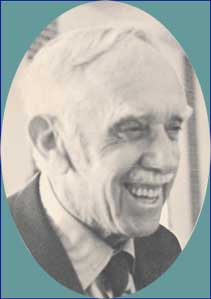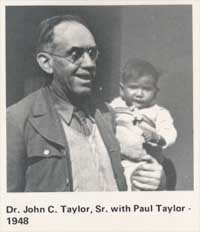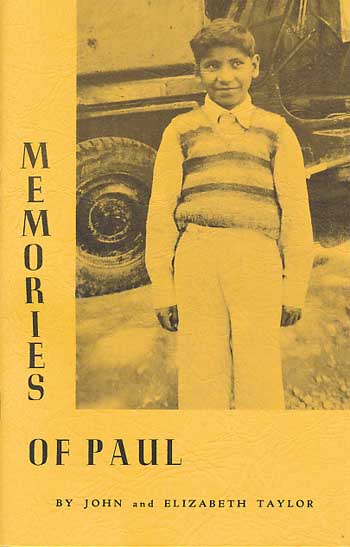MEDICAL MISSIONARY JOHN C. TAYLOR, SR.
 On December 13, 1973 the Lord called Home one of His faithful servants, Dr. John C. Taylor, Sr., who for more than fifty years had given of himself, his time and his talents to his Lord and Saviour, Jesus Christ, and to the people of India. He was a man greatly beloved of the Lord and by the people of India whom he served so faithfully and so lovingly. Many are the people who will remember Dr. Taylor for his great love and sacrificial service to them as he sought to bring to them physical healing for their bodies through means of his medical knowledge, and spiritual healing for their souls through his know¬ledge of the Word of God and his personal testimony to the power of Christ to save lost sinners. John Taylor was not only a medical doctor but also an ordained minister of the Gospel and a real evangelist.
On December 13, 1973 the Lord called Home one of His faithful servants, Dr. John C. Taylor, Sr., who for more than fifty years had given of himself, his time and his talents to his Lord and Saviour, Jesus Christ, and to the people of India. He was a man greatly beloved of the Lord and by the people of India whom he served so faithfully and so lovingly. Many are the people who will remember Dr. Taylor for his great love and sacrificial service to them as he sought to bring to them physical healing for their bodies through means of his medical knowledge, and spiritual healing for their souls through his know¬ledge of the Word of God and his personal testimony to the power of Christ to save lost sinners. John Taylor was not only a medical doctor but also an ordained minister of the Gospel and a real evangelist.
Born in Richmond, Kansas on April 9, 1886, of godly parents, John Taylor early came to know Christ as his personal Saviour. On August 14, 1913 he married Elizabeth Siehl, and together they went to India in November, 1914 and were stationed at Roorkee, U.P. where they labored for half a century, returning to the U.S.A. for retirement in October, 1967. They served under the Reformed Presbyterian Mission which, in 1965, became World Presbyterian Missions, the foreign board of the Reformed Presbyterian Church, Evangelical Synod. Mrs. Taylor passed to her Heavenly Home in March, 1970. Some years later, God provided another helpmeet for Dr. Taylor in the person of Mrs. Elizabeth H. Daniels, and the remaining years of Dr. Taylor’s life were enriched through her fellowship.
 Dr. Taylor was survived by his widow, Elizabeth D. Taylor, three sons—John, Jr., Carl and Gordon, and two daughters, Margaret Courtwright and Gladys McGarey.
Dr. Taylor was survived by his widow, Elizabeth D. Taylor, three sons—John, Jr., Carl and Gordon, and two daughters, Margaret Courtwright and Gladys McGarey.
A friend of both the high and lowly, Dr. Taylor became almost a legend in India. He was a man of faith and action, a good example of the kind of Christian of whom James writes, “I will show thee my faith by my works.” Nothing was too hard or sacrificial for him if, by doing it, he could help ease the physical or spiritual suffering of his fellowman. He especially ministered to the poor and downtrodden people in the villages of Northern U.P., India. His work varied from village evangelism, medical clinic work, relief work during the awful days of partition between India and Pakistan, to the founding in 1945 of the Children’s Home and Baby fold for the children of leprous parents in Bhogpur, which is now under the direction of his son, Gordon, and which now houses some 200 children. Dr. Taylor had the joy of seeing a number of these children come to know Christ as their personal Saviour and then go out to serve Him full time. Several of the children studied in the Theological Seminary at Roorkee and are now preaching the Gospel in India, and several more are now students at that Seminary. Others have gone into other fields of service where they are also witnessing for the Lord whom they came to know while at the Children’s Home.
During his semi-retirement, Dr. Taylor wrote of his experiences in India, which have been published in book form, India—Dr. John Taylor Remembers. This book reflects his touch with people, an essential ingredient in the life of any servant of Christ.
 Dr. Taylor was a valued member of the Saharanpour Presbytery of the Reformed Presbyterian Church, Evangelical Synod, and served his last years on the field under World Presbyterian Missions. To those who had the privilege of serving with him in India, he was a tower of strength and wisdom in so many matters concerning the work; but he was more than this—he was a kind and loving friend and counselor and a true “brother in Christ.” To many of the Indian Christians he was like a father. To the struggling National churches he was a guide and stay and inspiration. We rejoice that God gave him the great joy of seeing the beautiful church building at Bhogpur finished and used for the worship of Christ, before he retired from active missionary work in India. This building was erected largely through the efforts of Dr. and Mrs. Taylor and will be a continuing memorial of their sacrificial service for Christ and the people of India.
Dr. Taylor was a valued member of the Saharanpour Presbytery of the Reformed Presbyterian Church, Evangelical Synod, and served his last years on the field under World Presbyterian Missions. To those who had the privilege of serving with him in India, he was a tower of strength and wisdom in so many matters concerning the work; but he was more than this—he was a kind and loving friend and counselor and a true “brother in Christ.” To many of the Indian Christians he was like a father. To the struggling National churches he was a guide and stay and inspiration. We rejoice that God gave him the great joy of seeing the beautiful church building at Bhogpur finished and used for the worship of Christ, before he retired from active missionary work in India. This building was erected largely through the efforts of Dr. and Mrs. Taylor and will be a continuing memorial of their sacrificial service for Christ and the people of India.
No doubt Dr. Taylor has entered with great joy into the presence of Jesus Christ, his Lord and Saviour, and has heard him say, “Well done, good and faithful servant; thou hast been faithful over a few things, I will make thee ruler over many things; enter thou into the joy of thy Lord.”
The General Synod and World Presbyterian Missions are happy to pay tribute to such a saint of the Lord. We thank God upon every remembrance of him. “He being dead, yet speaketh.”
[excerpted from The Minutes of the 152nd General Synod of the Reformed Presbyterian Church, Evangelical Synod, 1974, pp. 157-158.]
Words to Live By:
Please take the above testimony as a good reminder to pray for our many missionaries, wherever they may be serving.
A bit of explanation on that last photo, above:
 The little boy, Paul, pictured in the arms of Dr. Taylor was their adopted child. In the little booklet, Memories of Paul, Dr. Taylor tells the story of how Paul came to be a member of the Taylor family. He begins:
The little boy, Paul, pictured in the arms of Dr. Taylor was their adopted child. In the little booklet, Memories of Paul, Dr. Taylor tells the story of how Paul came to be a member of the Taylor family. He begins:
“It was on February 2, 1948 when a Hindu leper came to us in Roorkee, asking us to take his child. For five months we had been working in Refugee Camps. We were now ready to go back into our own District work. How could we take a small, sick baby at a time like this? It seemed absolutely impossible. Yet, our hearts went out in pity for this poor leper and his child. The father knew, and we knew, that the child could not live if he kept him. Here was a little child brought to our very door. Christ said: “Forbid them not, for of such is the Kingdom of God.” So we took him and called him Paul. He was born September 19, 1947 in Rishikesh (nine miles from our Children’s Home in Bhogpur) where a group of lepers had built themselves little huts on the banks of the Ganges River. They made their living by begging from pilgrims on the street. A devastating flood had washed away most of their homes. In this dire condition most of them became sick and died, among them Paul’s mother. He was two months old at the time. For the next two months the father did the best he could to raise his baby. When he gave Paul to us he turned over an old, rusty cigarette tin, in which there was some dirty, clabbered milk, which he was feeding to Paul. Paul was so undernourished and weak that it seemed to us as though every breath might be his last. We tried to get one of our Christian women to take him while we went to camp, but no one would touch him, even though we offered to pay a salary and provide the milk. So, we took him to camp with us…”

No comments
Comments feed for this article